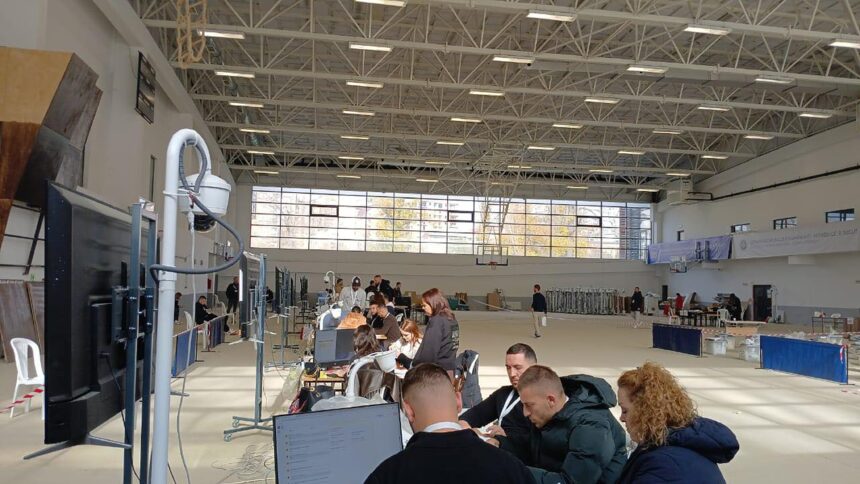Everything started on Monday evening, one day after the elections, when commissioners from the Democratic Party of Kosovo (PDK) and the Democratic League of Kosovo (LDK) in South Mitrovica withdrew from the vote verification process due to suspicions of irregularities.
These commissioners had encountered ballots with polling station codes that did not match the stations from which they originated. Later, it was determined that there were 75 such ballots.
By order of the prosecution, the verification was halted and resumed only a day later, again by a prosecution decision. The process has now concluded, but the discussion continues.
Shortly after the vote verification, the Central Election Commission (CEC) approved a recommendation to establish a commission to assess the ballots and ensure that the number of votes corresponded to the polling stations in South Mitrovica and Gjakova.
What is a polling station code and why did the process resume?
The polling station code is printed vertically in the top right corner of each ballot and indicates which polling station the vote belongs to.
For illustration, there are a total of 105 polling stations in South Mitrovica. Each has a unique code printed on every ballot given to voters when they cast their vote.
Following concerns raised by some commissioners in South Mitrovica, the CEC responded that there were printing errors in the polling station code but emphasized that this did not compromise the integrity of the elections.
The CEC was informed by the responsible Slovenian company, CETIS, that a full investigation had been conducted and that “the problem occurred in only one of the four printer heads that print the polling station numbers, while the system monitors only the serial number (QR code), which is why the error was not detected during printing.”
Following this clarification from CETIS, the prosecution ordered the resumption of vote verification.
How was CETIS selected?
To print ballots, candidate brochures, and voter lists for the 2025 local elections, the CEC of Kosovo had planned to spend €492,000.
The Slovenian company CETIS, in cooperation with the Kosovan company CETKOS, was awarded the contract for €489,362.40.
Although another company had applied offering a lower price of €397,566.19, it was eliminated on the grounds that its ISO certification was invalid and it did not meet the list of similar project requirements.
According to procurement data, the criterion for awarding the contract to CETIS was the lowest offered price by a qualified operator.
The same Slovenian company had printed ballots for the February 9 parliamentary elections in Kosovo.
Initially, the CEC had annulled the tender, eliminating all five applicants, including CETIS, due to missing documentation and unmet security requirements. CETIS had also offered a price more than double what the CEC had planned, at over €776,000, while the planned budget was €290,000.
About 20 days after the annulment, the CEC decided to award the contract to CETIS and CETKOS through a negotiated procedure, with a contract value of over €279,000.
The CEC did not respond to inquiries from Radio Free Europe as to why it chose a negotiated procedure instead of reissuing the tender.
Who is behind the Slovenian company?
CETIS is based in Celje, Slovenia, providing secure document solutions (biometric passports, ID cards, driver’s licenses) and other commercial printing services.
One of its executive directors, Radenko Mijatović, is also the president of the Football Association of Slovenia.
In March 2025, Mijatović signed a cooperation agreement with the energy company GEN, which had been a partner of the Slovenian national team until July of that year. Some media reports noted connections between GEN’s Serbian branches and Kosovo’s ambassador to Croatia, Martin Berishaj.
RFE did not find direct links between Ambassador Berishaj and any of the CEC-contracted companies, but his name was raised by several PDK representatives to further contest the election process in South Mitrovica.
Why isn’t Gjakova mentioned?
The same error — incorrect polling station codes — was observed in Gjakova. However, in this municipality, vote verification began and ended without any intervention by judicial authorities.
The chief official of the Municipal Election Commission in Gjakova, Armir Rexha, explained to Radio Free Europe that the problem was identified on election day.
“Only one ballot was affected at a polling station. We conducted the verification at the municipal counting center; everything is in order. The data matches,” he said, clarifying that other ballots with this error were not used.
He noted that the error was found in 12 out of 146 polling stations in Gjakova, but these ballots were not used since there were surplus ballots available.
Asked whether ballots with incorrect polling station codes were declared invalid, he said this decision is made by the members of the polling station councils at the municipal counting centers.
According to municipal counting center results, Ardian Gjini from the Alliance for the Future of Kosovo (AAK) won 56.43% of the votes, or 3,909 more votes than his rival, Ardian Gola from Vetëvendosje.
What does the law say?
Article 16 of the Electoral Regulation on “voting, counting at polling stations, and management” states that a ballot is valid if, among other conditions, it is sealed and has the serial number of the respective polling station.
Based on CEC manuals, Eugen Cakolli from the Democratic Institute of Kosovo says that ballots with errors should all be declared invalid.
“The CEC and the Electoral Complaints and Appeals Panel (ECAP) must conduct the relevant investigations and issue official statements on the impact these ballots have had on election results. Only through transparency and accountability can electoral integrity be restored,” Cakolli told RFE.
Has election integrity been compromised in South Mitrovica?
It depends on whom you ask. PDK representatives say yes, civil society members express concern, while LVV representatives and the CEC say no.
The runoff on November 9 resulted in Faton Peci from LVV winning 53.47% of the votes, or 2,315 more than his rival, Arian Tahiri from PDK, according to preliminary CEC data.
The CEC was asked whether ballots with irregularities would be declared invalid or counted, but it did not respond.
Before doubts about the ballots emerged, the PDK candidate had accepted the results and congratulated his LVV rival.
However, after concerns were raised, the PDK filed a complaint with ECAP, requesting a re-vote.
The night before, PDK candidate Tahiri stated on Dukagjini TV that almost all ballots with errors were votes for his opponent. The Municipal Election Office in South Mitrovica confirmed that votes from these ballots went to both candidates.
LVV Deputy Nezir Kraki insisted that the code errors did not compromise election integrity since voters still cast ballots for their preferred candidate.
The CEC also maintained that ballots have serial numbers enabling verification and correspondence with verified ballots at municipal counting centers.
Tahiri suggested that errors in serial numbers might have enabled the so-called “Bulgarian train” fraud method, which uses ballots from the diaspora.
What is the “Bulgarian train”?
This is a method of electoral fraud where a pre-filled fake ballot is handed to someone who is bribed or coerced into voting. They submit the fake ballot while taking a real one, which is then passed along for the next person in the chain, repeating the cycle.
Cakolli notes that such fraud is difficult to implement and can be easily monitored by the CEC.
His greater concern is the effect this process may have on citizens’ trust in electoral integrity, especially in the absence of greater transparency.
“Frequent elections and political crises inherently create voter apathy. When parts of the electoral process are contested, it casts a shadow over the entire election,” Cakolli says.
He also criticizes the CEC’s attempt to shift all responsibility to the Slovenian company CETIS.
“Even if this was a technical error that did not affect election integrity, the scope of the problem has not been clarified. The lack of answers adds to suspicions and allows other parties to contest the process further,” Cakolli adds.
The November 9 runoff marked the third time Kosovo citizens voted in 2025: February 9 parliamentary elections, October 12 first round of local elections, and November 9 second round.
There is also ongoing discussion about the possibility of early parliamentary elections, as the February 9 results did not produce a government, potentially resulting in four election days within a single calendar year.







